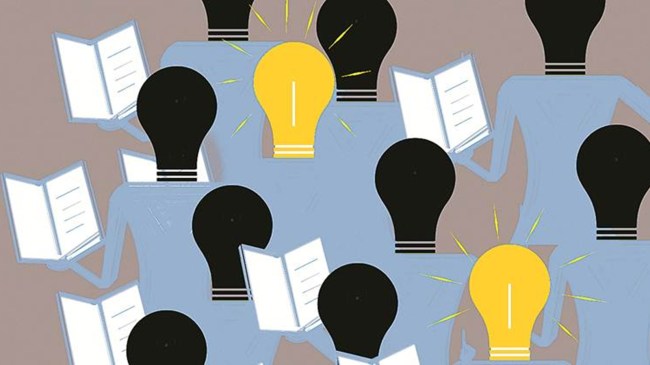Opinion Behind the country’s literacy milestones lies a spirit of volunteerism
In a world defined by technology and rapid information, literacy must today include the ability to compute, use digital tools, manage finances, and participate fully in civic life
 Aligned with the National Education Policy, 2020, ULLAS was launched in 2022 to provide educational opportunities to adults aged 15 and above who have missed formal schooling.
Aligned with the National Education Policy, 2020, ULLAS was launched in 2022 to provide educational opportunities to adults aged 15 and above who have missed formal schooling. “Learning is the discovery that something is possible.”—Fritz Perls
There is a circle of learning in every society. Those within it can read, understand, and act. Those outside remain silent, depending on others to speak and decide for them. Literacy is the line that separates the two. In a small village in Madhya Pradesh, Diya Bai spent years outside that circle. When she had to withdraw money from a bank or fill out an application for a scheme, Diya Bai would sit patiently until someone else helped her. Today, she not only does it herself but also guides other women in her village to claim benefits that were once beyond their reach. Her story reminds us that literacy is not a statistic to be counted but a life to be transformed.
It is this belief that led to the creation of ULLAS — Understanding of Lifelong Learning for All in Society. Aligned with the National Education Policy, 2020, ULLAS was launched in 2022 to provide educational opportunities to adults aged 15 and above who have missed formal schooling. Unlike earlier initiatives, it is driven by a deep sense of kartavyabodh — a collective responsibility to uplift every individual. This shared duty propels ULLAS’s drive for total literacy. The programme transforms schools into evening samajik chetna kendras, deploys mobile apps with primers in 26 languages, and uses digital platforms for remote reach. Citizens serve as volunteer teachers, creating a movement of over 2.8 crore learners and 45 lakh volunteers.
For generations, literacy meant the bare minimum — the ability to read and write a sentence. That definition was fit for a time when our most significant challenge was to lift millions out of complete illiteracy. However, in a world defined by technology and rapid information, literacy must today include the ability to compute, use digital tools, manage finances, and participate fully in civic life. The commitment to achieving full literacy is anchored in both international obligations and national policy. The UN’s Sustainable Development Goal 4.6 mandates that by 2030, all youth and a substantial proportion of adults achieve literacy and numeracy. The National Education Policy 2020 also emphasises the need for strong and innovative government initiatives for adult education to achieve 100 per cent literacy — it recognises the direct relation between literacy rates and per capita GDP. In August 2024, the Ministry of Education formalised this vision for the ULLAS programme, redefining literacy to encompass not just reading and writing, but computational skills, digital literacy, and financial literacy.
The impact of ULLAS is clearly visible. Rural literacy has risen from 67.7 per cent in 2011 to 77.5 per cent in 2023-24. Female literacy has surged from 65.4 per cent to 74.6 per cent. States are declaring themselves fully literate. Mizoram made the declaration earlier this year, followed by Goa and Tripura. Himachal Pradesh joined them last month.
While these milestones should be celebrated, the true strength of the mission lies not in numbers but in the human effort. Across the country, volunteers are carrying the flame of literacy forward. Be it Mandavi Soni, a young student from Madhya Pradesh’s Chhatarpur district, who went from door to door until 10 of her neighbours agreed to join classes, or Anshu Kumar, a government secondary school student from Gurugram who taught adults to read and then guided them in using ATMs, cheques, and online banking, millions of such stories exist, being told quietly around all of us. Their dedication proves that literacy is not built by the government alone. It is carried by people who give their time to others. I, too, have registered as a volunteer, because this is a responsibility we must all share. Let us all embrace the spirit of “Jan Jan Saakshar” and adhere to the concept of each one, teach at least one.
Literacy today is not just a few rows in a census table but a threshold. It is the step from silence into speech, from waiting into acting, from exclusion into belonging. The circle of society will always exist. The only question is how wide we are willing to draw it. With every learner, every volunteer, and every act of teaching, we can make that circle larger until no one is left outside.
The writer is Union minister of state (independent charge), skill development and entrepreneurship






